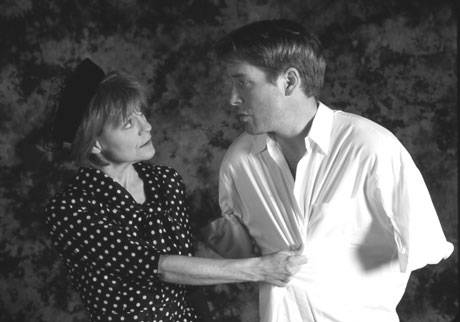By Davida Singer
During the 1960’s, the drug thalidomide, given to many pregnant women for morning sickness, created babies with serious birth defects-notably shortened or missing limbs. Now there’s “The Flid Show,” Richard Willett’s new play devoted to the subject, and running this month at Walkerspace.
“This is a play with music, a drama with lots of humor, which is my usual style,” says Willett, whose recent shows, “Triptych” and “Random Harvest” were Off Broadway hits. “It’s about a nightclub singer in London who has no arms, because his mother took thalidomide. He’s reluctant to identify himself as handicapped, or “flid” as they’re called in England, so he hides away in a dumpy club although he’s got a lovely singing voice. He’s visited by zany spirits, taken into the past, and eventually healed by confronting his own history.”
According to Willett, the concept for “The Flid Show” began with a story about thalidomide he’d heard as a child. He recalls being “frightened and fascinated” at the same time, and the impact crystallized his own sense of being different. At nineteen, he came to New York from Vancouver in order to write. He published several short stories, penned a novel, and eventually became a self-taught playwright, studying his favorites: Tennessee Williams and Edward Albee.
“In my case, being different was about being gay and being a writer,’ he explains. “I never forgot it. Then, in the early ‘80’s while working in a shipping room, I unpacked a book called ‘Suffer The Children,’ an in-depth study of the drug and it began to preoccupy me. I wrote a short story about it, and put it away, but it was always on my idea list.”
The idea came to life after Willett established a close working relationship with Ensemble Studio Theatre and director, Eliza Beckwith, who suggested he apply for a grant for writers dealing with scientific material.
“The Flid Show” fell into that category but the play ended up being much more personal, about this one man, Duncan. My themes have always been about alienation and the minor heroism of people who manage to connect at all. Duncan’s predicament turned out to be not as specific as I’d thought. It was about feeling flawed and therefore unworthy, so it was rather universal. And it’s timely, because thalidomide is back on the market, now given for cancer and AIDS. It works when used carefully, but who knows whose hands get on it?”
Why did Willett choose to put music into his play?
“I knew I was dealing with painful ideas, and I thought music and humor would bring entertainment into the piece. Having this talent to sing would bring attention to Duncan, so he’d be extraordinary for more than having no arms. Actually, there are quite a few “thalidomides” who have emerged as singers and actors, and I was inspired by them.”
“The Flid Show” is directed by Beckwith, who is also the co-founder of Willet’s production company, New Direction Theater. It has a cast of ten, headed by TV Soap star, Laurence Lau. The play’s recorded music is mixed with live segments by pianist, Louis Tucci.
“What’s closest to my heart is that it’s a play with a dynamic, sexy, romantic leading man who’s handicapped,” said the writer. “Hopefully, it might change people’s minds about the handicap, but in a larger sense, it’s also about forgiveness and acceptance. At one point, Duncan’s sister, Brenda, says to him, ‘If you want people to know you can sing, they’re also gonna have to know you’re thalidomide, okay? You hide one thing, you hide the other. You hide who you are. And you shouldn’t.’
“I think you could substitute a lot of things for thalidomide, and have the statement still ring true.”




































